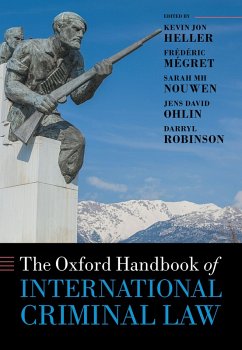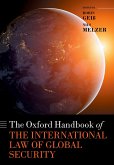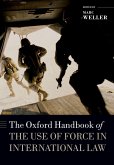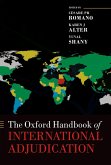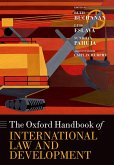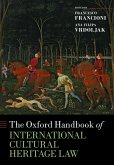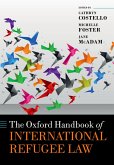The Oxford Handbook of International Criminal Law (eBook, PDF)
Redaktion: Heller, Kevin; Ohlin, Jens; Nouwen, Sarah; Mégret, Frédéric


Alle Infos zum eBook verschenken

The Oxford Handbook of International Criminal Law (eBook, PDF)
Redaktion: Heller, Kevin; Ohlin, Jens; Nouwen, Sarah; Mégret, Frédéric
- Format: PDF
- Merkliste
- Auf die Merkliste
- Bewerten Bewerten
- Teilen
- Produkt teilen
- Produkterinnerung
- Produkterinnerung

Hier können Sie sich einloggen

Bitte loggen Sie sich zunächst in Ihr Kundenkonto ein oder registrieren Sie sich bei bücher.de, um das eBook-Abo tolino select nutzen zu können.
In the past twenty years, international criminal law has become one of the main areas of international legal scholarship and practice. Most textbooks in the field describe the evolution of international criminal tribunals, the elements of the core international crimes, the applicable modes of liability and defences, and the role of states in prosecuting international crimes. The Oxford Handbook of International Criminal Law, however, takes a theoretically informed and refreshingly critical look at the most controversial issues in international criminal law, challenging prevailing practices,…mehr
- Geräte: PC
- mit Kopierschutz
- eBook Hilfe
- Größe: 4.5MB
![The Oxford Handbook of the International Law of Global Security (eBook, PDF) The Oxford Handbook of the International Law of Global Security (eBook, PDF)]() The Oxford Handbook of the International Law of Global Security (eBook, PDF)114,95 €
The Oxford Handbook of the International Law of Global Security (eBook, PDF)114,95 €![The Oxford Handbook of the Use of Force in International Law (eBook, PDF) The Oxford Handbook of the Use of Force in International Law (eBook, PDF)]() The Oxford Handbook of the Use of Force in International Law (eBook, PDF)126,95 €
The Oxford Handbook of the Use of Force in International Law (eBook, PDF)126,95 €![The Oxford Handbook of International Adjudication (eBook, PDF) The Oxford Handbook of International Adjudication (eBook, PDF)]() The Oxford Handbook of International Adjudication (eBook, PDF)31,95 €
The Oxford Handbook of International Adjudication (eBook, PDF)31,95 €![The Oxford Handbook of International Law and Development (eBook, PDF) The Oxford Handbook of International Law and Development (eBook, PDF)]() The Oxford Handbook of International Law and Development (eBook, PDF)114,95 €
The Oxford Handbook of International Law and Development (eBook, PDF)114,95 €![The Oxford Handbook of International Cultural Heritage Law (eBook, PDF) The Oxford Handbook of International Cultural Heritage Law (eBook, PDF)]() The Oxford Handbook of International Cultural Heritage Law (eBook, PDF)126,95 €
The Oxford Handbook of International Cultural Heritage Law (eBook, PDF)126,95 €![The Oxford Handbook of the Sources of International Law (eBook, PDF) The Oxford Handbook of the Sources of International Law (eBook, PDF)]() The Oxford Handbook of the Sources of International Law (eBook, PDF)126,95 €
The Oxford Handbook of the Sources of International Law (eBook, PDF)126,95 €![The Oxford Handbook of International Refugee Law (eBook, PDF) The Oxford Handbook of International Refugee Law (eBook, PDF)]() The Oxford Handbook of International Refugee Law (eBook, PDF)114,95 €
The Oxford Handbook of International Refugee Law (eBook, PDF)114,95 €-
-
-
Dieser Download kann aus rechtlichen Gründen nur mit Rechnungsadresse in A, B, BG, CY, CZ, D, DK, EW, E, FIN, F, GR, HR, H, IRL, I, LT, L, LR, M, NL, PL, P, R, S, SLO, SK ausgeliefert werden.
- Produktdetails
- Verlag: Oxford University Press
- Seitenzahl: 896
- Erscheinungstermin: 24. Februar 2020
- Englisch
- ISBN-13: 9780192558886
- Artikelnr.: 58724810
- Verlag: Oxford University Press
- Seitenzahl: 896
- Erscheinungstermin: 24. Februar 2020
- Englisch
- ISBN-13: 9780192558886
- Artikelnr.: 58724810
Robinson: Introduction
* SECTION I: ACTORS
* 1: Marie-Sophie Devresse and Damien Scalia: An Empirical Analysis of
International Criminal Law: The Perception and Experience of the
Accused
* 2: Jenia Iontcheva Turner: Defense Perspectives on Fairness and
Efficiency at the International Criminal Court
* 3: Dov Jacobs: Neither Here nor There: The Position of the Defence in
International Criminal Tribunals
* 4: Mikkel Jarle Christensen: The Creation of an Ad Hoc Elite: And the
Value of International Criminal Law Expertise on a Global Market
* 5: Neha Jain: Teachings of Publicists and the Reinvention of the
Sources Doctrine in International Criminal Law
* SECTION II: SPACES
* 6: Tom Dannenbaum: Legitimacy in War and Punishment: The Security
Council and the ICC
* 7: Christopher Gevers: Africa and International Criminal Law
* 8: Harmen van der Wilt: On Regional Criminal Courts as
Representatives of Political Communities: The Special Case of the
African Criminal Court
* SECTION III: RATIONALES
* 9: Miriam Gur-Arye and Alon Harel: Taking Internationalism Seriously:
Why International Criminal Law Matters
* 10: Mark A. Drumbl: Impunities
* 11: Marko Milanovic: Courting Failure: When Are International
Criminal Courts Likely to be Believed by Local Audiences?
* SECTION IV: CRIMES
* 12: Alexander K.A. Greenawalt: 'What is An International Crime?'
* 13: Alejandro Chehtman: A Theory of International Crimes: Conceptual
and Normative Issues
* 14: Samuel Moyn: From Aggression to Atrocity: Rethinking the History
of International Criminal Law
* 15: Edwin Bikundo: Enslavement as a Crime against Humanity: Some
Doctrinal, Historical, and Theoretical Considerations
* SECTION V: MODALITIES
* 16: Alette Smeulers: A Criminological Approach to the ICC's Control
Theory
* 17: Jean d'Aspremont: The Two Cultures of International Criminal Law
* 18: Adil Ahmad Haque: Immunity and Impunity
* 19: Mark Klamberg: Epistemological Controversies and Evaluation of
Evidence in International Criminal Trials
* 20: Leora Bilsky: The Right to Truth in International Criminal Law
* 21: Saira Mohamed: From Machinery to Motivation: The Lost Legacy of
Criminal Organizations Liability
* SECTION VI: NARRATIVES
* 22: Kim Christian Priemel: Historical Reasoning and Judicial
Historiography in International Criminal Trials
* 23: Lawrence Douglas: Criminal/Enemy
* 24: David Luban: The Enemy of All Humanity
* 25: Sofia Stolk and Wouter Werner: Moving Images: Modes of
Representation and Images of Victimhood in Audio-Visual Productions
* SECTION VII: ANXIETIES
* 26: Henry Lovat: International Criminal Tribunal Backlash
* 27: Sergey Vasiliev: The Crises and Critiques of International
Criminal Justice
* 28: Itamar Mann: Hangman's Perspective: Three Genres of Critique
following Eichmann
* 29: Marlies Glasius and Tim Meijers: Inequality of Arms Reversed?
Defendants in the Battle for Political Legitimacy
* SECTION VIII: BOUNDARIES
* 30: Laurel E. Fletcher: International Criminal Law and the
Subordination of Emancipation: The Question of Legal Hierarchy in
Transitional Justice
* 31: Sara Kendall and Sarah M.H. Nouwen: International Criminal
Justice and Humanitarianism
* 32: Cheah W.L.: International Criminal Law and Culture
* 33: Christine Schwöbel-Patel: The Core Crimes of International
Criminal Law
* 34: Douglas Guilfoyle: Transnational Crimes
* 35: Frédéric Mégret: The Unity of International Criminal Law: A
Socio-Legal View
* SECTION IX: FUTURE(S)
* 36: Gerry Simpson: International Criminal Law: The Next Hundred Years
Robinson: Introduction
* SECTION I: ACTORS
* 1: Marie-Sophie Devresse and Damien Scalia: An Empirical Analysis of
International Criminal Law: The Perception and Experience of the
Accused
* 2: Jenia Iontcheva Turner: Defense Perspectives on Fairness and
Efficiency at the International Criminal Court
* 3: Dov Jacobs: Neither Here nor There: The Position of the Defence in
International Criminal Tribunals
* 4: Mikkel Jarle Christensen: The Creation of an Ad Hoc Elite: And the
Value of International Criminal Law Expertise on a Global Market
* 5: Neha Jain: Teachings of Publicists and the Reinvention of the
Sources Doctrine in International Criminal Law
* SECTION II: SPACES
* 6: Tom Dannenbaum: Legitimacy in War and Punishment: The Security
Council and the ICC
* 7: Christopher Gevers: Africa and International Criminal Law
* 8: Harmen van der Wilt: On Regional Criminal Courts as
Representatives of Political Communities: The Special Case of the
African Criminal Court
* SECTION III: RATIONALES
* 9: Miriam Gur-Arye and Alon Harel: Taking Internationalism Seriously:
Why International Criminal Law Matters
* 10: Mark A. Drumbl: Impunities
* 11: Marko Milanovic: Courting Failure: When Are International
Criminal Courts Likely to be Believed by Local Audiences?
* SECTION IV: CRIMES
* 12: Alexander K.A. Greenawalt: 'What is An International Crime?'
* 13: Alejandro Chehtman: A Theory of International Crimes: Conceptual
and Normative Issues
* 14: Samuel Moyn: From Aggression to Atrocity: Rethinking the History
of International Criminal Law
* 15: Edwin Bikundo: Enslavement as a Crime against Humanity: Some
Doctrinal, Historical, and Theoretical Considerations
* SECTION V: MODALITIES
* 16: Alette Smeulers: A Criminological Approach to the ICC's Control
Theory
* 17: Jean d'Aspremont: The Two Cultures of International Criminal Law
* 18: Adil Ahmad Haque: Immunity and Impunity
* 19: Mark Klamberg: Epistemological Controversies and Evaluation of
Evidence in International Criminal Trials
* 20: Leora Bilsky: The Right to Truth in International Criminal Law
* 21: Saira Mohamed: From Machinery to Motivation: The Lost Legacy of
Criminal Organizations Liability
* SECTION VI: NARRATIVES
* 22: Kim Christian Priemel: Historical Reasoning and Judicial
Historiography in International Criminal Trials
* 23: Lawrence Douglas: Criminal/Enemy
* 24: David Luban: The Enemy of All Humanity
* 25: Sofia Stolk and Wouter Werner: Moving Images: Modes of
Representation and Images of Victimhood in Audio-Visual Productions
* SECTION VII: ANXIETIES
* 26: Henry Lovat: International Criminal Tribunal Backlash
* 27: Sergey Vasiliev: The Crises and Critiques of International
Criminal Justice
* 28: Itamar Mann: Hangman's Perspective: Three Genres of Critique
following Eichmann
* 29: Marlies Glasius and Tim Meijers: Inequality of Arms Reversed?
Defendants in the Battle for Political Legitimacy
* SECTION VIII: BOUNDARIES
* 30: Laurel E. Fletcher: International Criminal Law and the
Subordination of Emancipation: The Question of Legal Hierarchy in
Transitional Justice
* 31: Sara Kendall and Sarah M.H. Nouwen: International Criminal
Justice and Humanitarianism
* 32: Cheah W.L.: International Criminal Law and Culture
* 33: Christine Schwöbel-Patel: The Core Crimes of International
Criminal Law
* 34: Douglas Guilfoyle: Transnational Crimes
* 35: Frédéric Mégret: The Unity of International Criminal Law: A
Socio-Legal View
* SECTION IX: FUTURE(S)
* 36: Gerry Simpson: International Criminal Law: The Next Hundred Years
